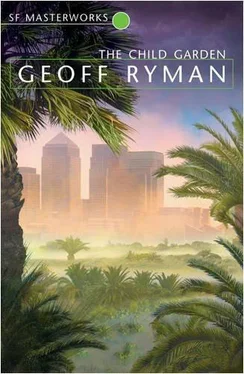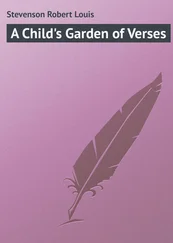It was a short walk back to the Gardens, though the Gardens were a different world. Rose Ella walked back home with her. ‘How can I become a Restorer? Is there time to learn?’ Milena asked her.
‘If it’s right for you, there will be time,’ Rose Ella said. ‘Now good night, love. You come to see us soon.’
Who would have thought life could suddenly turn so delicious? In front of the door to her block, Milena looked up at the stars. Rose Ella. Rose Ella, she said, over and over to herself, as she thumped up the stairs, her head wobbling from side to side to the sound of the reels. Rose Ella, Rose Ella, she thought as she lay on her little bed by the window. She could still look up and see the stars. I want to go back there, she thought. I want to be a Restorer and live in the Row. I want to knit glass, and save the old books. I want to learn how to play the pipes and I want to dance.
It was Rose Ella she wanted to dance with. The stars seemed to spin overhead, and she fell asleep, slipping into darkness with a smile.
All that summer, Milena visited Rose Ella. She stayed overnight at the Row, sleeping in a guest bedroom, that was stuffed with luxury. It had built-in Chinese cabinets. Milena would sit at a table, reading her books, and look up and see the doors of the cabinets. Ivory people had been inlaid in them. The people hunted or they fished or they carried bundles of grainstalks on their backs. But some of the ivory people had fallen out, leaving a hole behind them, a space that was in their shape, grey and broken, forever. Sometimes, most poignantly, their tunics or their shoes would be left behind, still in their shape, as if waiting for their return.
Milena remembered the bathrooms, which were a wonder. The bathtub was huge and stood on metal legs. The white enamel was wearing through and the great brass taps were lopsided. There was a strange metal plunger, that you had to lift up and turn to keep it raised so that the bath would drain. There was a footbath, and there was a toilet bowl that was moulded in the shape of animals and inside the basin it said in blue lettering ‘The Deluge’. The Milena who remembered saw all of this as clearly as if she could simply turn a corner and find it all still there, real and solid.
She remembered exploring a house by High Holborn that was being restored. Its roof had gone, and most of the floorboards. Milena and Rose Ella had to tiptoe on the foundations, the poured concrete, the rows of bricks. Yet colour still clung to the walls. Milena remembered a yellow room, with a broad band of red all around it. In the corners, where some of the ceiling was left, there were spreading plaster fans, mouldings. Just inside one of the doors, there was panelling of wood on all the walls. The wood was grey and weatherbeaten now, open to the sky and the rain. The stairwells were empty. There was only a zigzag tracing up the walls where the stairs had been. A fireplace still had its tiles. They were green with red flowers, twenty-first century Gothic. The grate had gone bright orange with rust.
‘People got very rich,’ said Rose Ella, leaning over it. ‘Some people. Just before it all went wrong. They lived in big houses. They had many houses, and travelled all over Britain, all over Europe, to live in them for a week, for a few days. Can you imagine that? Shall we fly my dear to Edinburgh for the weekend?’ She adopted a deep and portly voice.
‘Why not? What amusement,’ said Milena, imitating a Tarty wife. Together they stepped arm in arm across the missing floorboards, balancing on brick supports.
‘Imagine being this rich,’ said Rose Ella again.
‘It’s as if, if we could climb the stairs, and find a way into one of those rooms, we’d everything back in place, with the people there. Like they didn’t know anything had changed.’
‘Ugh!’ said Rose Ella and shuddered. ‘I wouldn’t want to end up back there. You and I would just be servants. Coming in miles every day in the train.’
‘Breathing poison.’
‘Thinking the world was going to end.’ Rose Ella suddenly stepped forward. ‘You’ve got to see this,’ she said. She pulled Milena into the next room.
Stinging nettles grew high outside the windows. But here in this last room, the floorboards were in place, fitting perfectly. The floor was beautiful. There was no ceiling, just one huge beam all the way across the room. And still clinging to that one beam, by purest luck, there was a huge light fitting, a kind of frozen fountain of plaster, moulded into leaf shapes, and ending with a small hole in the tip.
‘What is it?’ Milena asked. It looked like some kind of wasp’s nest.
‘It was for lights,’ said Rose Ella. ‘It was called a rose. A ceiling rose. Now, look at this, too!’
She pulled Milena with her, into the next room and spun her around. In an arch over a broken door, a wall painting still remained. It showed a man in some kind of chariot, flying through the air, pulled by horses.
‘Is that an airplane?’ Milena asked, and knew it was a stupid question as soon as she asked it. An airplane with horses, sure. But she had no viruses to show her what an airplane had looked like, and had never bothered to find a book about them. Rose Ella kept looking up, pretending that Milena had not said anything out of the ordinary.
Beyond the broken doorway there was a pile of roof slates, all in a layered heap where they had avalanched, their edges chipped like stone-age arrowheads. On the yellow walls someone had written in a kind of flourishing red marker.
Raisa 2050
and underneath that, in the same hand, but with smudged charcoal
Raisa (again!) 2085
They carefully picked their way over the heap of slates. They jumped and danced through a wall of bitter nettles. Milena stumbled over something and pulled it out. It was a tiny brass bedstead. It was all black and chewed except for one little floral ring around it, bent but still bronze-coloured. Milena suddenly could imagine it new, part of a child’s bed, a child’s bed with a duvet covered in small blue flowers. She imagined the child in it, a little girl with long brown hair, sweet and soft and innocent and privileged. She looked up at the windows, empty now and staring at the sky. What would she have thought, Milena wondered, if she had known what was coming?
It was as if the building were a train, carrying lives with it like passengers, moving at high speed until it hit the barriers. Then there was wreckage.
Rose Ella’s father went off one summer morning early, in a wagon train. He and seven other men were off to Cumbria to fetch new stone. All the Row was gathered to see them off. Everyone waved. Milena had come early to wave as well. Rose Ella wept, though she couldn’t say why. She had some kind of bad feeling. Something awful could happen on the road to Cumbria.
For the next month, there were still dances in the Row, with fewer fathers to dance with. The music became sadder. Milena remembered Mala, playing her fiddle. The fiddle was tucked under chin, and her eyes were faraway, remembering, and the sound of the fiddle was high and sad and sweet, coaxing out the heart of the old songs.
It was the music of home. Milena felt she had found a family, a people, a place. She thought she had found a future as well.
The ocean currents were unstable. The Gulf Stream moved back and forth. Bleak, blasted summers could be followed by howling winters, choked with snow.
Towards the end of that summer, it rained. Milena spent whole days in the Row, reading books, hearing the rain on the roof while Rose Ella knitted and her sister made immortal flowers. Paving stones dropped underfoot, spurting up mud. The ground was a muddy morass. The turf in the parks was as springy as mattresses. The trees hung their drenched and heavy leaves low, dripping water.
Читать дальше












